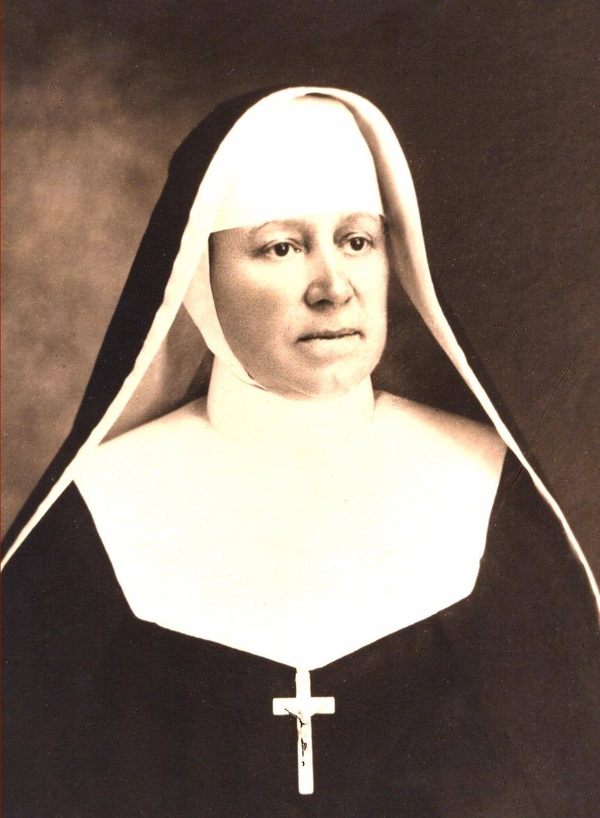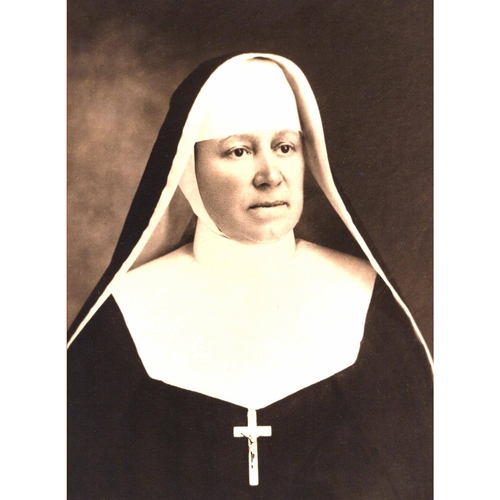
Source: Courtesy of Wikimedia Commons
SIMARD, FRANÇOISE, named Marie du Bon Conseil, founder and superior general of the Sœurs de Notre-Dame du Bon Conseil de Chicoutimi; b. 18 Jan. 1851 at the Saint-Alphonse mission (Saguenay), Lower Canada, daughter of Hyppolite Simard, a farmer, and Dosithée Simard; d. 11 May 1937 at the congregation’s mother house in Chicoutimi (Saguenay).
Françoise Simard attended the local parish school until 1864, but delicate health, which would adversely affect her activities all her life, prevented her from taking the examinations. For ten years she helped her mother with various household tasks. On 23 Aug. 1874 Françoise left her native parish to enter the noviciate of the Congregation of the Sisters, Servants of the Immaculate Heart of Mary, known as the Sisters of the Good Shepherd [see Marie Fisbach*], where she was initiated into the religious life and completed her education. She was forced to return home on 21 June 1876 because of serious pulmonary haemorrhaging. Following her convalescence, on 30 Oct. 1877 Françoise entered the noviciate of the Sisters of Charity of the Hôpital Général of Montreal, known as the Grey Nuns, which she would also have to abandon for health reasons on 24 May 1878. In 1880 curé Pierre-Hubert Beaudet engaged her as housekeeper in the presbytery of Saint-Alphonse-de-Liguori in Bagotville (Saguenay). When he died on 31 March 1888, Françoise received a life annuity. At age 39 she went to live with her sister Olympe and her husband, Cléophe Brassard, in the township of Tremblay (Saguenay).
In 1892 Françoise was hired as a primary-school teacher in Saint-Fulgence, on the north shore of the Saguenay River. At the same time, the new bishop of the diocese of Chicoutimi and apostolic administrator for the apostolic prefecture of the Gulf of St Lawrence, Michel-Thomas Labrecque, was making plans to develop the regions he oversaw. To respond to educational needs, he contemplated founding a congregation of teaching nuns for the parish schools. He entrusted the principal and prefect of studies at the Petit Séminaire de Chicoutimi, Elzéar De Lamarre*, with the task of inviting Miss Simard to assume responsibility for the new congregation. She saw in this request the opportunity to enter into religious life, something she had looked forward to since leaving the Grey Nuns. On 3 Nov. 1894 she crossed the Saguenay and presented herself at the bishop’s residence, where a companion, Georgianna Bergeron, awaited her. The Sœurs de Notre-Dame du Bon Conseil de Chicoutimi was established the following day. Bishop Labrecque then undertook the training of the nuns according to the spirit and the teachings of St Francis of Sales, which were based on gentleness, goodness, and love. Concerned about both their intellectual and pedagogical advancement, Bishop Labrecque also gave them a weekly lecture. Françoise’s experience with the Sisters of the Good Shepherd enabled her to help develop the rules by which the future teaching nuns would live. On 8 Dec. 1894 she and her companion dressed in the habit they themselves had designed. Françoise Simard took the name Sister Marie du Bon Conseil. She would make her vows of poverty, chastity, and obedience on 24 Dec. 1896 and her final vows on 4 Nov. 1899.
The foundation’s teaching work began on 2 Sept. 1895 when two nuns, Sister Sainte-Anne and Sister Marie de l’Assomption, were hired at the École du Centre in Chicoutimi. They were employed for only one year owing to the opposition of the Sisters of the Good Shepherd, to whom the first bishop of Chicoutimi, Dominique Racine*, had given the exclusive right to teach in the town’s schools. Lacking an endowed charitable organization, 6 of the 17 nuns of the new congregation took over domestic work at the Séminaire de Chicoutimi in 1896. The sisters would benefit from this source of income until 1904.
On 27 March 1899 the Sœurs de Notre-Dame du Bon Conseil de Chicoutimi established its first general council consisting of four nuns: Mother Marie du Bon Conseil, superior general; Sister Saint-Jean-Baptiste, assistant; Sister Saint-Jean-Berchmans, counsellor and mistress of novices; and Sister Sainte-Anne, counsellor. The council was, however, short-lived because, apart from Mother Marie du Bon Conseil, the nuns were appointed to the first schools that were founded. Five were approved during this period: Magpie (Rivière Saint-Jean) (1899–1902), Natashquan (1899–1902), Saint-Joseph-des-Sept-Îles (Sept-Îles) (1900–3), Tadoussac (1900–6), and Betsiamites (1901–90). The apostolic prefecture of the Gulf of St Lawrence was separated from the diocese of Chicoutimi in 1903, which led to the abandonment of the first three schools. The congregation began two new charities in 1902 in the archdiocese of Quebec, namely the Hôpital Guay (1902–89) for the poor and the infirm, founded by the priest Charles Guay in Saint-Joseph-de-la-Pointe-de-Lévy (Lévis), and a boarding school for boys in Montmagny (1902–4), set up at the invitation of the village curé, Victor-Odilon Marois. Mother Marie du Bon Conseil also responded to demands from her own diocese to institute parish schools in Saint-Jean-Baptiste-de-l’Anse-Saint-Jean (L’Anse-Saint-Jean), which opened in 1902, and in Saint-Joseph-d’Alma (Alma) (1902–43). At the request of the region’s school commissioners, she agreed to create four new establishments: Saint-Cœur-de-Marie (Alma) (1903–16), Saint-Gédéon (1903–68), and Grande-Baie (Saguenay) and Sainte-Anne-de-Chicoutimi (Saguenay), both opened in 1904. One of the principal tasks of Mother Marie du Bon Conseil was to negotiate working conditions for the nuns in these enterprises, and she was able to obtain good housing and salary arrangements for them.
“Our difficult year,” Mother Marie du Bon Conseil would say of 1904, during which the community had to acknowledge a debt of about $17,000 accumulated during the construction of a house and chapel near the Montmagny boarding school. To prevent news of the debt spreading, and to re-establish peace in a conflict involving curé Marois and the contractor for the work, Charles Vézina, she handed the buildings over to the latter and paid the debts. She also had to remove the nuns from the school because of the disagreement with the priest. In the same year she accepted the voluntary departure of six nuns who were called to form the Sœurs de Saint-Antoine de Padoue [see Elzéar De Lamarre]. The community then had 42 nuns. Subsequently, other schools they founded were taken over by the local school boards: Bagotville (1907–70); Saint-Félicien, opened in 1907; Ouiatchouan (Mashteuiatsh), opened in 1910; Péribonka (1911–20); Saint-Prime, opened in 1911; Albanel (1912–95); Rivière-du-Moulin (Saguenay) (1912–25); Normandin (1914–20); Val-Jalbert (Chambord) (1915–29); and Saint-Jérôme (Métabetchouan–Lac-à-la-Croix) (1916–77).
In 1914 the 48 professed nuns proceeded to elect members of the general council, and Mother Marie du Bon Conseil was again named superior general. Sister Saint-Emmanuel, who had held the office of general assistant since 1901, was not re-elected and would threaten to leave the community. Mother Marie du Bon Conseil informed Bishop Labrecque, who annulled the election and reinstalled Sister Saint-Emmanuel in her post. This situation engendered a profound uneasiness in the community. The superior, who was silenced by the bishop on the matter, found herself in a difficult position that would last for the remainder of her term, and even beyond. A phrase she would repeat in times of adversity, “He is the Master,” remains the manifest sign of her resignation and her acceptance of both the trials of life and the decisions of those in authority.
After 24 years as superior general, Mother Marie du Bon Conseil had to step down from her headship in 1918, the code of canon law adopted by Rome the previous year having established for the future the duration of a term of office. In 1919 the congregation had 106 nuns, who were in charge of 17 educational establishments and taught nearly 3,000 children. At the age of 67 Mother Marie du Bon Conseil was elected counsellor and local superior of the mother house. When her health permitted, she accompanied the nuns who were travelling. With the new superior general, Sister Saint-Elzéar, in 1924 she visited the schools she had founded, thus rediscovering her place in the heart of her community. That year Bishop Labrecque, who had finally gained a better understanding of the situation, spoke approvingly in Rome of Mother Marie du Bon Conseil. According to him, she was beloved by her whole community and the nuns unanimously recognized her unfailing benevolence towards them.
In accepting Bishop Labrecque’s invitation, Mother Marie du Bon Conseil contributed to the education of children in elementary schools in an era when permanent teachers were lacking. As the educational system evolved, the community she founded participated in the pedagogical training of teachers beyond the confines of the diocese of Chicoutimi, even to sub-Saharan Africa, where it helped establish a congregation of indigenous teachers.
The author wishes to thank Sister Esther Chouinard, the director of the Centre Historique des Sœurs de Notre-Dame du Bon-Conseil de Chicoutimi, for her valuable assistance during the course of research.
BANQ-SLSJ, CE201-S1, 19 janv. 1851. Le Progrès du Saguenay (Chicoutimi [Saguenay, Québec]), 14 mai 1937. [Bethsaïda Drouyn, named Sœur Saint-Jean-de-Dieu], Une figure du Saguenay: mère Marie-du-Bon-Conseil, fondatrice de l’institut des Sœurs de N.‑D. du Bon Conseil de Chicoutimi, 1851–1937 ([Chicoutimi?, 1938?]). Laurie Goulet, “Les méconnus de l’histoire: Françoise Simard, mère Marie-du-Bon-Conseil,” Saguenayensia (Chicoutimi), 44 (2002), no.3: 57. [Stella Hamann, named Sœur Sainte-Hélène], Mère Marie du Bon Conseil, fondatrice et première supérieure générale de l’institut des Sœurs de Notre-Dame du Bon-Conseil de Chicoutimi, 1851–1937 ([Chicoutimi?, 1957?]). Denise Robillard, La traversée du Saguenay: cent ans d’éducation: les Sœurs de Notre-Dame du Bon-Conseil de Chicoutimi, 1894–1994 ([Saint-Laurent [Montréal]], 1994).
Cite This Article
Denise Robillard, “SIMARD, FRANÇOISE, named Marie du Bon Conseil,” in Dictionary of Canadian Biography, vol. 16, University of Toronto/Université Laval, 2003–, accessed December 28, 2025, https://www.biographi.ca/en/bio/simard_francoise_16E.html.
The citation above shows the format for footnotes and endnotes according to the Chicago manual of style (16th edition). Information to be used in other citation formats:
| Permalink: | https://www.biographi.ca/en/bio/simard_francoise_16E.html |
| Author of Article: | Denise Robillard |
| Title of Article: | SIMARD, FRANÇOISE, named Marie du Bon Conseil |
| Publication Name: | Dictionary of Canadian Biography, vol. 16 |
| Publisher: | University of Toronto/Université Laval |
| Year of publication: | 2014 |
| Year of revision: | 2014 |
| Access Date: | December 28, 2025 |



